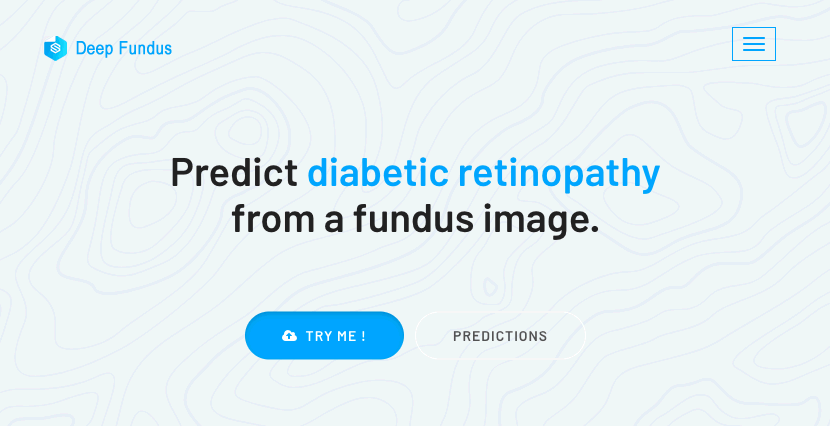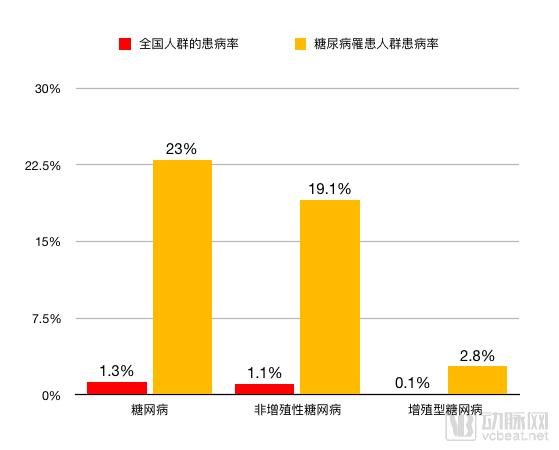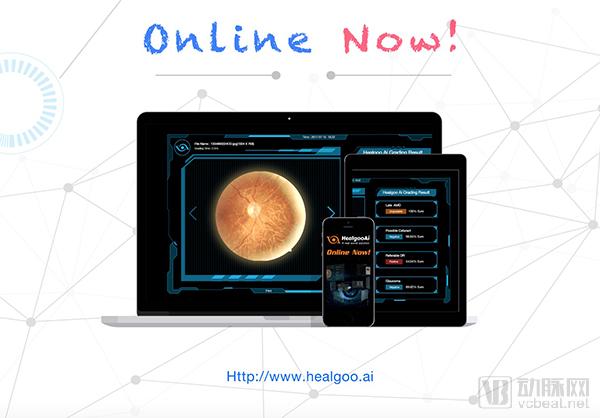
5/7/2018
Healgoo Interactive: Expanding the ophthalmology market from grassroots institutions, providing 12 kinds of AI prediction models to help “diabetic retinopathy screening + AI” landing
On July 5th, Vcbeat.net conducted an exclusive interview with Healgoo Interactive Artificial Intelligence products. The following is the content of the interview.
Healgoo Interactive was established in September 2013 and was founded by a number of senior medical experts and artificial intelligence experts. They discovered the value of AI during the treatment of eye diseases and began to develop. After nearly 4 years of accumulation, Healgoo AI, an artificial intelligence diagnosis system, was launched in 2017, and the ophthalmology version of the system was launched in June 2018, with the name: Deep Fundus.
Deep learning is one of the biggest breakthroughs in the field of artificial intelligence in the near future, bringing hope to the commercialization of artificial intelligence. Beginning with the 2012 ILSVRC champion AlexNet, the convolutional neural network in deep learning began to shine in the field of computer vision. Healgoo Interactive thus established the technical development direction of using the deep learning algorithm to predict the fundus photos.
Now, Healgoo Interactive has become a 36-member company with a complete strategic thinking and stable income model, dedicated to medical big data and artificial intelligence diagnostic technology research. So far, Healgoo Interactive has obtained a number of invention patents including intelligent fundus cameras, and related papers on deep learning algorithms have been published in the international core journal Ophthalmology.
First-class R&D team impacts AI barriers and complements each member
The main projects of Healgoo Interactive are led by co-founder and CTO Wei Meng. Wei Meng has served as a Microsoft technical specialist, HIPAA security specialist overseas, and obtained the NHS certified diabetic retinopathy grader certificate in the UK. He has in-depth research in the field of AI technology.
Robert Chang, another senior ophthalmologist of the team, is from Stanford University in the United States. He has long been engaged in glaucoma, cataract surgery, etc. He is good at new methods and applications of minimally invasive techniques, and has many achievements in ophthalmic medical technology innovation and artificial intelligence.
Chief scientist Mingguang He is a professor at Zhongshan Ophthalmic Center at Sun Yat-Sen University. He is a professor of ophthalmology at the University of Melbourne, Australia. He is a recipient of the National Outstanding Youth Fund, a national leader in the “Millions of Plan”, and a young and middle-aged science and technology innovation leader in the Ministry of Science and Technology. Professor Mingguang He's research interests include clinical and genetic epidemiological studies of ophthalmic diseases, randomized clinical trials, twin studies, image technology research, artificial intelligence, and big data research. His research has been recognized by a wide range of international peers.
It can be seen that this is a team who complements technology and medical practice. Professor Mingguang He proposed the application direction of artificial intelligence from the frontier research field of ophthalmology, and provided professional ophthalmology support for AI. Professor Robert Chang designed the top-level AI algorithm and practice demonstrate the rationality of the AI during operation process. The specific implementation of the algorithm and system is completed by the technical team led by Wei Meng.
Deep learning helps fundus photo screening
Since 2013, Healgoo Interactive has been involved in the study of deep learning algorithms. Through unremitting efforts and attempts, Healgoo Interactive has independently developed a pre-processing algorithm for the optimization of fundus photos, as well as a high-performance convolutional neural network HG-Net, which has achieved remarkable results in the disease classification of fundus photos. The relevant core technologies have obtained national invention patents and have been published in international academic journals.
As we all know, in the field of deep learning, data has a very important position. On the one hand, the training of deep learning requires a large amount of data support in order to train a model with better robustness. If the data set is not enough, the model tends to have over-fitting or under-fitting. On the other hand, the labeling of the data set should be accurate. Otherwise, the accuracy of the model is difficult to improve. In general, data and characteristics determine the upper limit of a model, and the optimization and adjustment of the algorithm is only to approximate this upper limit.
In order to improve the accuracy of the labels of fundus photos, Healgoo Interactive has developed a data labeling platform, Label Me, on which the professional ophthalmologists label the images. Each fundus photo will be labeled by multiple doctors. Only the images with consistent results will be used for training. Many experts in Healgoo’s team have very rich experience in the field of ophthalmology, and have great advantages in the labeling of fundus photos.
These efforts have given Healgoo a leading edge in technology and data, and have accumulated experience in disease prediction in fundus photographs, providing strong support for the Deep Fundus and Healgoo AI platforms.
Directly hit the market pain points and reduce the burden on ophthalmologists
How big is the ophthalmology market? According to the official data of the Health and Welfare Commission, the value of the Chinese ophthalmology market in 2012 was 46.1 billion, which was updated to 82.7 billion in 2016. Experts predict that in 2021, the domestic ophthalmology market will rise to 159 billion.
Specifically, as of 2015, the number of diabetic patients in China is about 110 million, which is estimated to be about 27 million people with diabetic retinopathy disease in China.

The incidence of diabetic retinopathy in China
In the process of diagnosing patients with eye diseases, experts in the Healgoo team found that doctors have limited resource to meet the needs of a large number of patients. The AI technology pushed by the huge requirements of ophthalmic diagnosis can greatly improve their work efficiency, and thus the joint professionals have carried out the development of AI technology and gave birth to Deep Fundus, Healgoo's eye disease auxiliary diagnosis system with artificial intelligence.
Deep Fundus is used for doctor-side auxiliary examinations. It can provide 12 kinds of AI prediction models online. It can not only check diabetic retinopathy, but also apply to other eye diseases such as glaucoma, cataract, macular edema, macular degeneration, etc., in one fundus photo. The statistical results show that the overall accuracy of the AI system ranges from 0.986 to 0.995, the sensitivity is over 95%, and the specificity is over 91%. The average accuracy of the diabetic retinopathy grader trained by NHS is 75%.
The algorithms used in the AI system were developed by Healgoo Interactive itself. With 200,000 selected fundus photos as the training set, an additional 70,000 fundus photos are selected as the verification set, and the comprehensive accuracy rate is 99.0%. In addition, the AI took 18,000 samples at the Royal Victoria Hospital in Australia for independent verification. The accuracy of the recognition of the diabetic retinopathy was 98.9%, that of glaucoma was 98.6%, that of cataract was 99.1%, and that of macular degeneration was 99.5%.
With the focus of grassroots service services, the service area gradually radiates nationwide.
Grassroots hospitals often fail to obtain the desired service results because of the lack of experience of medical personnel. The Healgoo Artificial Intelligence Eye Disease Aided Diagnosis System can assist grassroots doctors to improve the accuracy of analysis; doctors can also learn the results of AI analysis and improve their professional level.
For the large-scale environment such as township screening and physical examination centers, the AI can screen four kinds of eye diseases at one time, and the inspection rate is greatly improved. Patients can print reports on the spot, eliminating the cost of multiple round trips to the hospital, and the physical examination center can also reduce the cost of medical examinations and improve the service plans for medical examination centers.
For people who need pre-diabetes screening, the AI can quickly generate pre-diagnosis information on the status of diabetic retinopathy, solve the problem of inconvenient eye disease referral, and more effectively manage chronic diseases.
In response to the reluctance of putting data on the cloud in some domestic tier one hospitals, Healgoo Interactive has launched a corresponding offline system to ensure the security of hospital data.

The Vcbeat.net reporter learned in the interview that more than 300 hospitals across China are currently using the Healgoo Artificial Intelligence Eye Disease Aided Diagnosis System, which screens more than 100,000 patients each year. The Healgoo artificial intelligence grading robot has covered dozens of medium and large cities such as Beijing, Shanghai, Shenzhen and Chongqing, and has thus entered other central cities. On the other hand, Healgoo Interactive is also constantly exploring overseas markets. Institutions from the United States, India, Malaysia, Singapore and other countries have participated in cooperation.
Based on eye diseases, but not limited to eye diseases
Even though the Healgoo Artificial Intelligence Eye Diagnostic Diagnostic System has reached a high level of accuracy, Healgoo Interactive researchers are continually optimizing algorithms and trying to mine more information from fundus photos to correlate other diseases to improve the coverage of users of the system.
At the same time, Healgoo Interactive is also constantly deepening the research of artificial intelligence. The company created the Healgoo ML platform to solve common image classification problems. Users with image data can use this platform to create their own AI models. The platform is still under test and will be available online in July.
As early as 2016, Healgoo Interactive has received 10 million financing, and now the company's products are mature and in the market development. Healgoo Interactive hopes to communicate with more experts in the field of ophthalmology and artificial intelligence to jointly empower image screening in ophthalmology.
Click to view: the source on Vcbeat.net

